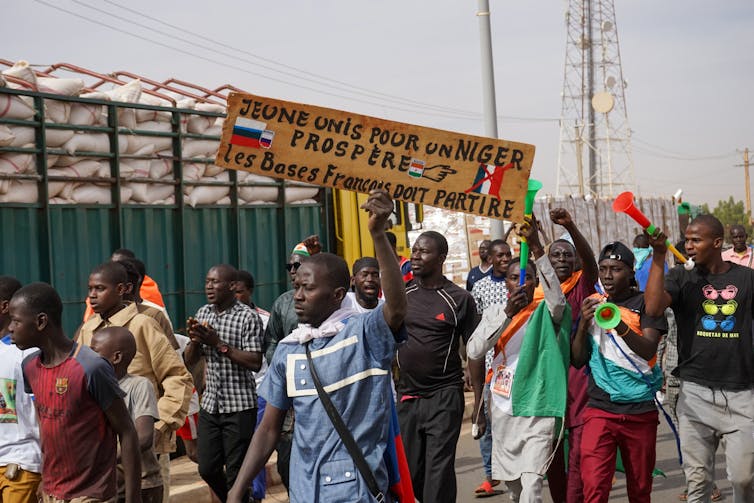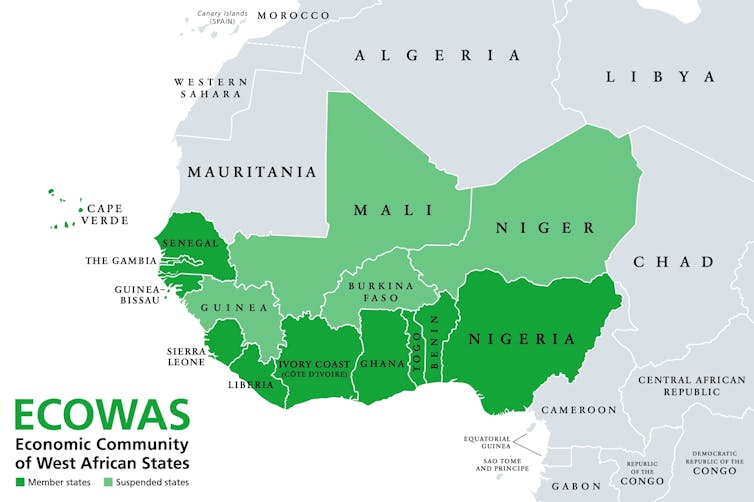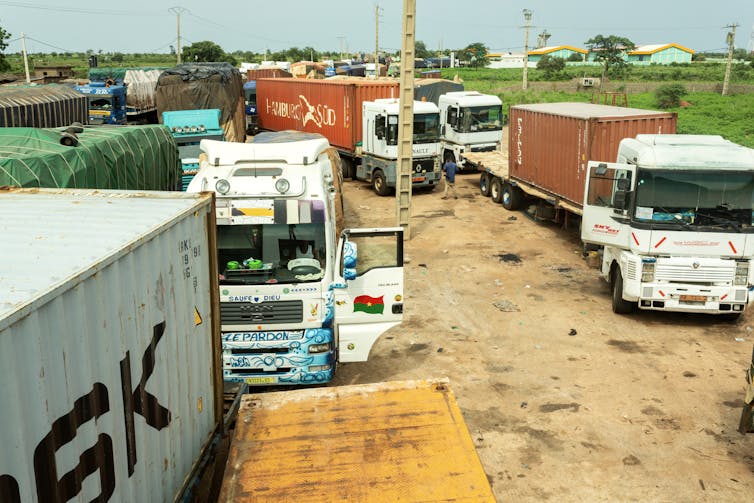
The response to the coup marked a significant political shift in the region. Ecowas imposed economic sanctions on Niger and issued a seven-day ultimatum, vowing to use force to dislodge the military junta (a government led by a council of military officers) should it not restore Bazoum to power. But the junta refused to back down and Burkina Faso, Mali and Guinea pledged to counter any action by Ecowas troops in Niger.
The agreement of these leaders and their readiness to take military action against Ecowas revealed the extent of their animosity towards the organisation and its leaders. These three countries, which are also governed by military rulers who have ousted democratically elected leaders in recent years, have all been hit with punitive sanctions since 2021.


On September 16 2023, Burkina Faso, Mali and Niger signed a new mutual defence pact named the Alliance of Sahel States. Ecowas is encouraging these countries to return to the bloc by lifting its sanctions. But new partners like Russia, which is looking to increase its influence across the continent, are at the same time supporting their efforts to form a united front.
African governments have increasingly welcomed economic, diplomatic and security ties with Russia, facilitated in part by the state-backed Wagner Group (now called the “Expeditionary Corps”). The group is known for deploying paramilitary forces, running disinformation campaigns and propping up influential political leaders.
The Company Of The Old Guards
Ecowas has a patchy track record when it comes to ensuring cooperation and security across west Africa. In 1990, the military arm of Ecowas was deployed in a peacekeeping role in Liberia. Despite some initial success, Ecowas was unable to prevent an escalation of hostilities that lasted for the best part of a decade.
Similarly, despite efforts by Ecowas to restore peace in Sierra Leone after a coup in 1997, a brutal civil war broke out, requiring the intervention of UN peacekeepers.
Ecowas has been instrumental in safeguarding democracy within the region as well. In 2016, Gambia’s incumbent leader, Yahya Jammeh, refused to leave office after losing a presidential vote to Adama Barrow. But, with Ecowas troops poised to march on the capital, Banjul, Jammeh relinquished power.

However, Ecowas has been inconsistent in its condemnation of military and civilian coups. And it has also been criticised for overlooking unlawful term extensions, a common practice among many entrenched leaders in the region.
In 2015, Ecowas leaders dropped a proposal to limit west African presidents to a maximum of two terms in office. As a result, there is no established protocol for penalising leaders from member states who seek to remain in power indefinitely.
This paved the way for the presidents of both Ivory Coast and Guinea (Alassane Ouattara and Alpha Condé respectively) to secure controversial third terms in 2020. The failure of Ecowas to intervene resulted in Condé being ousted from power by a military coup one year later.
According to Oge Onubogu, the director of the Africa Program, a Washington-based think tank: “Ecowas is fast losing its effectiveness and support among citizens, who see it as representing only the interests of the leaders and not that of the masses.”
The Challenger Group
The loss of any member from Ecowas will affect trade, economic development and the movement of citizens within the bloc. But the decision by Ecowas to lift post-coup sanctions signals its readiness to negotiate and cultivate relationships with these countries, regardless of whether they rejoin the organisation.
Ecowas says that the decision to lift sanctions was based on considering their impact on citizens and the need to maintain regional unity and security. Ecowas also noted the period of Lent and the approaching month of Ramadan as factors influencing their decisions.

Millions of young Africans are being drawn to the Alliance of Sahel States, signalling discontent with the ineffectiveness of Ecowas and disillusionment with the west. Russia has capitalised on this trend. The Wagner Group is reportedly offering military support to willing African leaders in the form of “regime survival packages”.
A competitor to Ecowas appears to have emerged in west Africa, and this alliance is not backing down. Only time will tell whether the new alliance will favour the citizens of west Africa.
Have An Advert Or Article You Want Us To Publish? WhatsApp: +256760530830.

